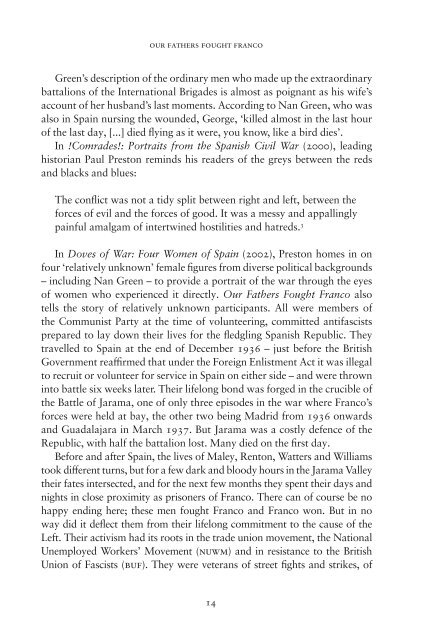Our Fathers Fought Franco by Willy Maley sampler
resonant piece of working class history, this book is a living link to four extraordinary stories. Why did these young men put their lives on the line and go to Spain to fight with the International Brigades? How did they all end up in the same prison cell? And what is their legacy today? James Maley, George Watters, Donald Renton and Archibald Williams were members of Machine Gun Company No. 2 of the XV International Brigade. This is the first book to focus on a small group of men who, from different starting-points, ended up on the same battleground at Jarama, and then in the same prisons after capture by Franco’s forces. Their remarkable story is told both in their own words and in the recollections of their sons and daughters, through a prison notebook, newspaper reports, stills cut from newsreels, interviews, anecdotes and memories, with a foreword by Daniel Gray. Our Fathers Fought Franco is a collective biography that promises to add significantly to the understanding of the motives of those who ‘went because their open eyes could see no other way’.
resonant piece of working class history, this book is a living link to four extraordinary stories. Why did these young men put their lives on the line and go to Spain to fight with the International Brigades? How did they all end up in the same prison cell? And what is their legacy today?
James Maley, George Watters, Donald Renton and Archibald Williams were members of Machine Gun Company No. 2 of the XV International Brigade. This is the first book to focus on a small group of men who, from different starting-points, ended up on the same battleground at Jarama, and then in the same prisons after capture by Franco’s forces.
Their remarkable story is told both in their own words and in the recollections of their sons and daughters, through a prison notebook, newspaper reports, stills cut from newsreels, interviews, anecdotes and memories, with a foreword by Daniel Gray.
Our Fathers Fought Franco is a collective biography that promises to add significantly to the understanding of the motives of those who ‘went because their open eyes could see no other way’.
Create successful ePaper yourself
Turn your PDF publications into a flip-book with our unique Google optimized e-Paper software.
<strong>Our</strong> <strong>Fathers</strong> <strong>Fought</strong> <strong>Franco</strong><br />
Green’s description of the ordinary men who made up the extraordinary<br />
battalions of the International Brigades is almost as poignant as his wife’s<br />
account of her husband’s last moments. According to Nan Green, who was<br />
also in Spain nursing the wounded, George, ‘killed almost in the last hour<br />
of the last day, [...] died flying as it were, you know, like a bird dies’.<br />
In !Comrades!: Portraits from the Spanish Civil War (2000), leading<br />
historian Paul Preston reminds his readers of the greys between the reds<br />
and blacks and blues:<br />
The conflict was not a tidy split between right and left, between the<br />
forces of evil and the forces of good. It was a messy and appallingly<br />
painful amalgam of intertwined hostilities and hatreds. 3<br />
In Doves of War: Four Women of Spain (2002), Preston homes in on<br />
four ‘relatively unknown’ female figures from diverse political backgrounds<br />
– including Nan Green – to provide a portrait of the war through the eyes<br />
of women who experienced it directly. <strong>Our</strong> <strong>Fathers</strong> <strong>Fought</strong> <strong>Franco</strong> also<br />
tells the story of relatively unknown participants. All were members of<br />
the Communist Party at the time of volunteering, committed antifascists<br />
prepared to lay down their lives for the fledgling Spanish Republic. They<br />
travelled to Spain at the end of December 1936 – just before the British<br />
Government reaffirmed that under the Foreign Enlistment Act it was illegal<br />
to recruit or volunteer for service in Spain on either side – and were thrown<br />
into battle six weeks later. Their lifelong bond was forged in the crucible of<br />
the Battle of Jarama, one of only three episodes in the war where <strong>Franco</strong>’s<br />
forces were held at bay, the other two being Madrid from 1936 onwards<br />
and Guadalajara in March 1937. But Jarama was a costly defence of the<br />
Republic, with half the battalion lost. Many died on the first day.<br />
Before and after Spain, the lives of <strong>Maley</strong>, Renton, Watters and Williams<br />
took different turns, but for a few dark and bloody hours in the Jarama Valley<br />
their fates intersected, and for the next few months they spent their days and<br />
nights in close proximity as prisoners of <strong>Franco</strong>. There can of course be no<br />
happy ending here; these men fought <strong>Franco</strong> and <strong>Franco</strong> won. But in no<br />
way did it deflect them from their lifelong commitment to the cause of the<br />
Left. Their activism had its roots in the trade union movement, the National<br />
Unemployed Workers’ Movement (NUWM) and in resistance to the British<br />
Union of Fascists (BUF). They were veterans of street fights and strikes, of<br />
14


















